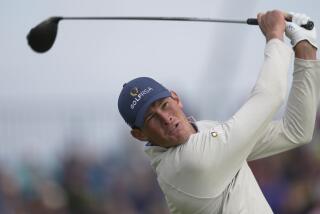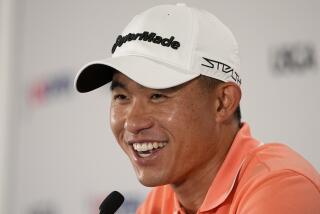Ernie Els’ path to victory at last year’s British Open wasn’t easy
- Share via
GULLANE, Scotland — It hasn’t always been a walk in the park for Ernie Els, the current toast of the golf world. There have been some hard times for the Big Easy.
Now is not one of them, of course.
He is here for the 142nd British Open, as both defending champion and the most recent winner on the legendary Muirfield course, where this week’s field will battle wind, bad bounces and pot bunkers, some deep enough to house a small car. Then, there is the gorse, of course.
Els won last year at Royal Lytham & St. Annes in England and won the 2002 British here.
Monday morning, he returned the fabled Claret Jug to officials of the Royal and Ancient, who run this event. That is traditional, as are the questions afterward about how well he treated this piece of hardware history in the year in which he, as champion, was allowed to have it and do with it as he pleased.
He said he traveled the world with the trophy and took lots of pictures. But, he added, it wasn’t as hard to clean as in 2002, when he had imbibed from it a bit more.
“Not as much [buffing] was needed as in 2002,” Els said. “We are getting a little older.”
He has won four majors — two U.S. Opens (1994 and ‘97) and two British (’02 and ‘12). But he was cajoled into saying that, yes, after lots of thought, his out-of-nowhere victory last year resonated with him the most.
“The one at Lytham felt so special,” he said. “The hair on my arms wouldn’t go down — walking from the 18th tee right through to the putt that went in — my hair was just standing up. I think that’s because of the fourth one coming so — the way it happened. You know the story.”
There are lots of elements to that story.
Els’ main reference was that he had spread out his major victories over 18 years and had gone 10 between his third and fourth. He also referred to Adam Scott’s finishing with four bogeys, opening the door for him last year.
But there was more left mostly unsaid Monday, when he met the press. His nickname refers to an effortless golf swing, not an effortless life.
In the several years prior to Royal Lytham, he had struggled almost to the point of embarrassment. Coming into last year’s British, he had missed the cut at the previous two. He couldn’t even play in the Masters preceding Royal Lytham, because he no longer qualified.
“I went through a couple of bubbles,” Els said Monday.
He went through the creeping feeling that he was done, that he was now in his 40s and his chances to win majors, which is why all these guys play, were evaporating.
His putting was especially galling and he even told reporters along the way that he feared people, including other players, were starting to laugh at him.
The simple solution would have been to rationalize a slow retirement, to take the pressure off himself with little speeches in the mirror that reminded him that only a handful of people have won three majors. He had all the money he needed and would ever need. He could still play enough to win a few big checks, and he had, and has, a nice golf-course design business in place.
There was also some good timing that could have helped ease, and further rationalize, a slow departure. In 2011, he was inducted into the World Golf Hall of Fame.
Instead of easing out, Els dug deeper to get back. Being a non-factor did not sit well with him. He worked harder, got in better shape, even went to a long putter. He hired a woman named Sherylle Calder, another South African. She specializes in visual synchronization. Suddenly, his putts started rolling in again.
Still, few took notice until he sank that 20-footer for birdie on No. 18 of last year’s British and won when Scott, a few groups later, missed an eight-footer on the same hole.
At age 42, Ernie Els was back.
Still, even with that, things aren’t all that easy.
Els’ only son, Ben, born in the same year he won at Muirfield, is autistic. By his own admission, Els knew nothing about autism and says you don’t “until it is dropped in your lap.” Els and his wife, Liezl, waited until 2008 to make their son’s situation public and now are leading spokespeople and fundraisers for the cause.
Monday, in a quiet moment around the putting green before he went out for a practice round, Els chatted with a reporter about Ben. No, Ben couldn’t understand what he had done when he won the British last year, Els said. It wasn’t something he could talk to him about.
“He can’t quite process that,” he said.
To which he quickly added that it didn’t matter, that Ben just wanted dad around and wanted to be loved.
Doing that, he indicated, is the real big easy in his life.
More to Read
Go beyond the scoreboard
Get the latest on L.A.'s teams in the daily Sports Report newsletter.
You may occasionally receive promotional content from the Los Angeles Times.











